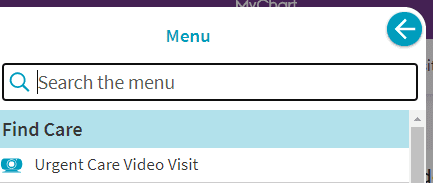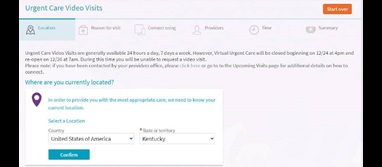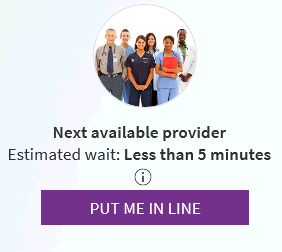After COVID-19 Symptoms (Long COVID)
Side Effects After Having COVID-19?
Baptist Health has developed a program for patients that had COVID-19 and are still experiencing symptoms or do not feel they have fully recovered, also known as after COVID symptoms. If you are experiencing any issues after having COVID-19 such as persistent shortness of breath, exercise intolerance, or ongoing symptoms, you can get care now from Baptist Health's long COVID program via a virtual visit with a provider.
What Is Long COVID?
Long COVID, or long term COVID, is a medical condition in which the symptoms of COVID-19 linger for more than four weeks. Persons with long COVID are also referred to as suffering from post-COVID syndrome. Most individuals with COVID-19 recover in a matter of weeks, but evidence is growing that, at least some of the time, the disease is linked to a variety of long-term complications. Some symptoms appear with the initial infection, while others manifest after a delay. Scientists do not currently understand the reason for the disparity in recovery times. The hope is as research continues, we learn more about appropriate treatment methods that are able to assist in managing the condition.
An estimated 35 million Americans have been infected by the SARS-CoV-2 virus. Some percentage of those infected will become COVID “long haulers,” experiencing symptoms lasting as much as a year or more. To learn more about COVID-19 and the risk of developing long COVID, contact your local Baptist Health physician.
Are you experiencing side effects after COVID-19 and don't know how to get answers? You can get the care you need through Baptist Health's long COVID-19 program, available 24 hours a day, 7 days a week, with a virtual visit from a Baptist Health provider. Our providers are able to provide the care you may need or refer you to the right specialist, if necessary. Start your video visit now.
Long COVID Symptoms & Side Effects
Long COVID symptoms vary widely, with many of them similar to those of the initial infection. Some after COVID symptoms include:
- Dulled senses (loss of taste and smell)
- Fatigue, especially after physical exertion
- Headache
- Coughing
- Fever
- Dizziness
- Labored breathing
- Heart palpitations
- Loss of focus (“brain fog”)
- Chest pain
- Joint and muscle pain
- Anxiety
- Depression
Although COVID-19 is chiefly a respiratory disease, long COVID can impact organs other than the lungs. This is because the SARS-CoV-2 virus contains an enzyme, ACE2, that attaches itself to cells in a variety of tissues. Long COVID has been linked to damaged heart muscles, blood clots, strokes, seizures, Guillain-Barre syndrome, Parkinson’s disease, Alzheimer’s disease, kidney and skin problems, autoimmune conditions, and multisystem inflammatory syndrome.
COVID side effects can also have negative impact on psychological health, including increased incidences of anxiety, depression, and post-traumatic stress syndrome (PTSD).
How Is Long COVID Managed?
With the growing awareness of long COVID, medical researchers are working on ways to diagnose and manage this condition. (Diagnosis is complicated by the fact that long COVID symptoms mirror those of several other diseases.) Diagnosis involves:
- Learning from patients by interacting with those who are suffering from unexpected or recurrent medical problems related to a COVID-19 infection
- Utilizing best-practice methods to address the health conditions exhibited by these individuals
- Taking a multidisciplinary approach to the provision of care.
Long COVID, or post-acute sequelae of SARS CoV-2, can last for many weeks or even months. Some individuals eventually recover but others continue to deal with chronic symptoms.
Those with post COVID symptoms can seek care through Baptist Health Virtual Care visits today.
Preventing Long COVID-19 from Baptist Health
The best way to prevent long COVID is to receive a COVID-19 vaccination.
How to Get Care for Long COVID
If you're experiencing afters effects of COVID-19 and don't know where to get started, Baptist Health is here to help. To get care so you can get back to life, Baptist Health has a video visit program available.
A video visit provides convenient access to Baptist Health providers for patients of age 2 and older, whether you are at home, in the office or while away from home. Long-term COVID-19 video visits are available 7 days a week 24 hours a day on your smartphone, tablet, or computer. It's easy to use, free to enroll, private and secure. Your insurance will be billed for this visit and collect a co-pay per your insurance. Any portion not covered by your insurance plan will be billed and collected after the visit.
You must have or create a MyChart account to use Virtual Care. If you don't currently have a MyChart account, you can sign up and get started in one easy step.
The video visit will be provided through Zoom which will open on your desktop. If on mobile, please download the Zoom app. You do not need a Zoom account for an urgent care video visit.
How to Get Started with a Long COVID Video Visit
- Sign into MyChart on your computer or MyChart mobile app. You can also sign up now to get started in one easy process.
- Click menu, then select "Urgent Care Video Visit".

- Confirm your current location.

- Select a reason for your visit.
- Choose whether you will use a computer or a mobile app. The MyChart mobile app is the preferred method of connection which will cue you to download the Zoom mobile app. If you use your computer, you will be prompted to allow the Zoom to download. You do not have to have a Zoom account.
- Review the estimated wait time and click "put me in line".

- When a provider is ready to see you, you will receive an email and/or mobile app alert that you can join the visit.
